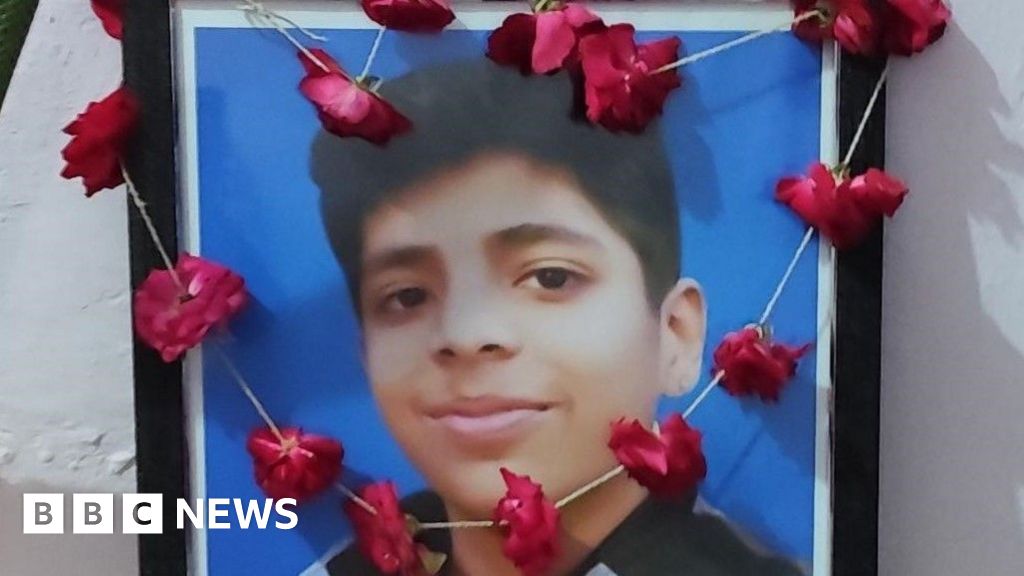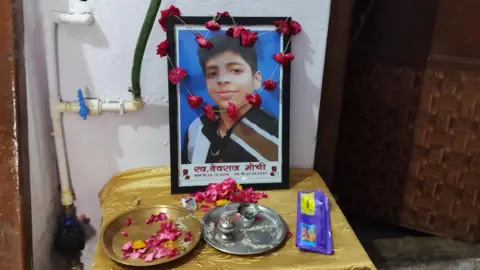 BBC
BBCThe killing of a 15-year-old boy by a classmate last month has fuelled religious tensions in an Indian city, leaving one family grieving and the other shattered by the crime.
On 16 August, Heena* learned her teenage son Zakir*, 15, had been accused of stabbing a classmate at their school in Udaipur, Rajasthan.
Zakir allegedly pulled a knife from his backpack and attacked Devraj, a Hindu boy, who died in the hospital three days later.
The incident sparked a stream of grief and anger as well as a conversation on how to deal with violence in classrooms.
The state police denied any religious angle to the incident. “The students had an argument over notebooks which turned ugly,” investigating officer Chhagan Purohit told the BBC.
But the incident set off a wave of religious violence.
False rumours that Zakir, a Muslim, planned the killing went viral on WhatsApp, sparking protests in Udaipur with right-wing Hindu groups torching vehicles and chanting anti-Muslim slogans, leading to a curfew and internet shutdown.
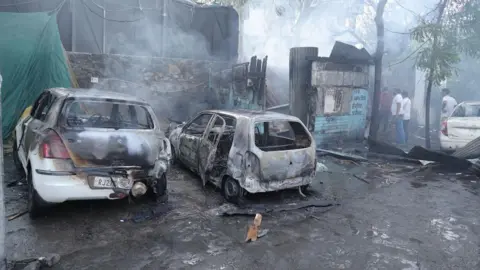
Zakir was taken into custody and sent to a juvenile home, while his father was arrested on the charges of abetment to murder, Mr Purohit said.
The next day, following a familiar pattern in Bharatiya Janata Party-ruled (BJP-ruled) states, bulldozers demolished Heena’s rented home, leaving her and her four daughters homeless.
“My son deserves punishment and I hope he learns to be a better human being,” Heena said. “Why did they have to punish his entire family?”
Though the violence has subsided, Udaipur residents are shaken by how a simple fight escalated. Many now fear their once-integrated Hindu-Muslim neighbourhoods are being torn apart along religious lines.
“Things are getting worse and we can feel it,” one of Heena’s neighbours said on condition of anonymity.
For Devraj’s family, everything else pales in comparison to the pain of losing their son.
“This is the news every parent dreads,” his father Pappu Lal told the BBC.
A cobbler in Kuwait, he found out about the incident while he was thousands of miles away from home. By the time he got home, his son was unconscious. He died without getting a chance to see or speak to his father.
The trauma, Mr Lal said, catapulted his wife and him into debilitating sadness and sparked fury inside him.
“Their house was demolished but we lost our son,” Mr Lal said. “The house can be built again but our child? He will never come back.”
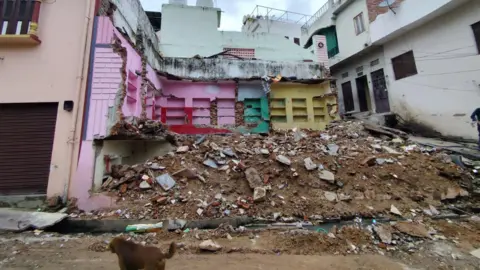
The incident has become a political sore point for the BJP, which governs India and Rajasthan, after some opposition leaders accused the party of fuelling religious tensions for political gains.
Authorities claim that the house where Heena lived was demolished because it was illegally built on forest land. A notice was sent to Heena a day before the action.
But her brother Mukhtar Alam*, who owns the house, questioned how the demolition could take place when only the tenants were alerted. “It was my house and I built it with a lot of hard work. How can they just come and raze it without even telling me?”
He also asked why the other houses in the area were still standing if they were all built on forest land.
Mukesh Saini, an official in Udaipur’s forest department, told the BBC that action would be taken against those structures “at an appropriate time”.
“Right now the atmosphere is not right for that,” he said.
Critics have questioned the timing of the act and say that punishing someone for an alleged crime using laws meant for another makes no sense.
In BJP-governed states like Uttar Pradesh, Madhya Pradesh, and Assam, bulldozers often swiftly demolish the homes of crime suspects, with officials touting this as evidence of their tough stance on law and order. While victims include Hindu families, opposition leaders and activists argue that these demolitions disproportionately target Muslims, especially following religious violence or protests.
“There is no logic to it except the communal logic of collective punishment and the authority acting as the populist dispenser of tough vigilante justice,” said Asim Ali, a political scientist.
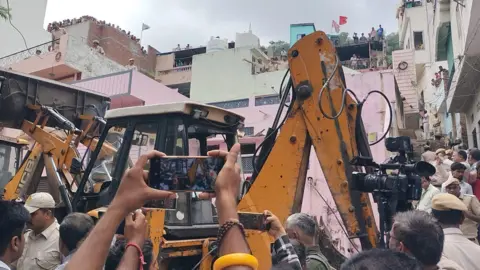
India’s Supreme Court recently criticised the demolition of properties linked to people accused of crimes and said it would issue guidelines around this.
Manna Lal Rawat, the BJP’s Udaipur MP, told BBC Hindi that the demolition was not connected to the stabbing. He also alleged that the stabbing occurred because the accused student “was influenced by extremists” and said he had urged the police to ensure the killing was not a part of a “larger pattern”.
An uneasy calm has prevailed in Udaipur since 2022, when two Muslim men beheaded a Hindu man, filmed the assault and posted it online. They said the act was in response to his support for a politician’s divisive remarks about the Prophet Muhammad.
The killing had sparked massive protests and violence in the city for days.
“The memories of that murder are still alive in the minds of people,” a senior Rajasthan police official, who wanted to stay anonymous, told the BBC. “That’s why a fight between two children turned into riots. Due to politics, the peace of the city has been damaged.”
But Mr Lal cannot understand what prompted the fight in the first place.
He says his son was a good boy – as mischievous as a 15-year-old could be, but also sweet and innocent.
“He never fought with anyone in school. He wanted to become a policeman when he grew up, become the voice of justice,” he said, his eyes on Devraj’s picture in the corner of the living room.
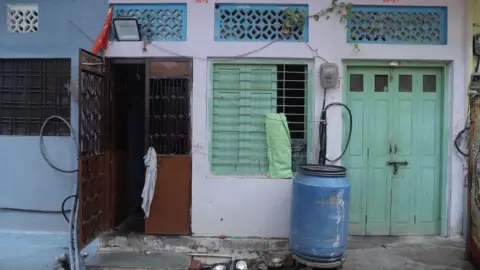
Since Devraj’s death, hundreds of people have been visiting the family’s small house, located in a bustling neighbourhood where Hindus and Muslims have lived peacefully together for years.
But for Mr Lal and his grieving wife, all condolences feel meaningless.
He refuses to talk about the violence or what may have caused it, saying that’s for the administration to answer. “I just want justice for my son”.
Questions have also been raised about the school’s handling of the case.
Mr Lal alleges that no teacher accompanied Devraj to the hospital and that he was taken there on a motorbike by two of his classmates.
The school’s principal, Isha Dharmawat, who has since been suspended for negligence of duty, denied the allegation.
She said she had asked the students to take Devraj on her motorbike to avoid any delay in treatment and that she and four other teachers had also gone to the hospital immediately.
As the city limps back to normalcy, the effects of the incident are most starkly visible at the school where the children studied.
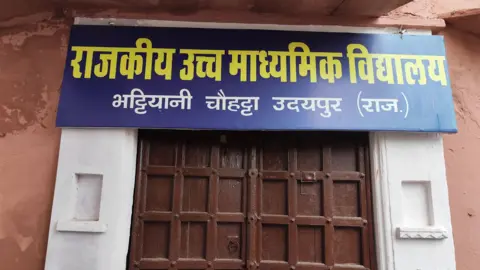
After the stabbing, the school closed for a week and reopened with only one student attending.
The two students who accompanied Devraj to the hospital were questioned by police and soon left the city, citing safety concerns. Parents still sending their children to school are worried about their safety.
“Children should be kept out of politics till they are ready to face the world. This has shaken us all up,” a parent who wanted to remain unnamed said.
Meanwhile, Heena is desperately trying to piece her life back together.
“Half of my belongings are still buried [under the debris of the demolished house]. After the demolition, no one wants to rent me a house,” she said.
Even now, she wonders how her son got the knife or why he allegedly used it on his friend. Was it collapsing mental health, a childish rivalry or something else? She does not know.
But she does know that she will forever be seen as an enabler of the violence and its resulting hatred, and as a terrible parent.
“Everything of mine has been taken away. Now if people want to hang my child, then hang him, what else can I say?”
*Names of the accused and his family have been changed as Indian laws don’t allow juvenile offenders to be identified
